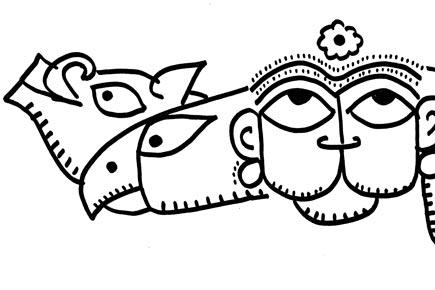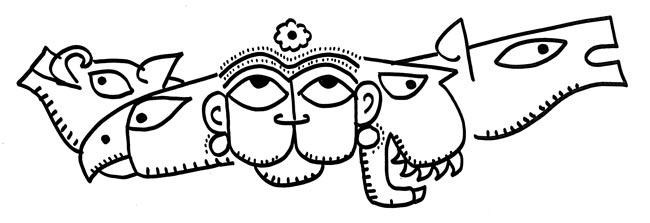It all started with the Harry Potter series. Suddenly magic became a cool world amongst children.

 It all started with the Harry Potter series. Suddenly magic became a cool world amongst children.
It all started with the Harry Potter series. Suddenly magic became a cool world amongst children.
And when Indian children started looking for magic in their own backyard, they rediscovered mythology, a world of fantastic beings who do fantastic things.
But what is interesting is how these mythological stories are being interpreted nowadays. It reveals the power of European and American thought processes on the Indian mind.

Illustration/ Devdutt Pattanaik
I remember meeting an earnest dancer who told me rather confidently, how Ram was an Aryan invader who was there to destroy South Indian dark-skinned Rakshasa tribes, just as before him, Devas led by Indra destroyed the cities of North India, again dark-skinned, Asuras. This dancer now wanted me to explain the Ramayana within the boundaries that he had drawn, boundaries that he was convinced are objective and true.
I did not have the heart to tell him that this reading of mythology along racial lines was made popular in the early part of the 20th century by British Orientalists, who were struggling to understand India and Indians, who seemed relatively indifferent to their own history. They popularised this ‘racial’ and ‘invasion’ theory. It reaffirmed their faith in the superiority of white people. It also justified their rule of India, by declaring that the dominant communities of India, the Muslim rulers of various states, and their Brahmin ministers, were all descendants of earlier invaders. Was this a conscious strategy or a genuine theory, since then rejected? We will never know. Of course, we can argue over it relentlessly over a cup of tea.
Then, I received an email from an angry social activist who asked why Hindus worship a man who abandoned his pregnant wife in the forest. I realised since judgement had been pronounced, I was suddenly being asked to ‘defend’ Ram as I am a mythologist and a Hindu. The parametres of discussion were being defined by the email writer and thus he was unwilling to listen to anything that demanded the parametres be changed.
This reading of Indian epics like Ramayana using the lens of ‘fairness and justice’ has been popularised by American scholars. America prides itself as the first nation on Earth to challenge feudalism and monarchy, and establishing a new governance model based on democracy. And so American scholars, willy-nilly, see red whenever they see a ‘model king’. Ram is thus activist fodder, easy to rip apart. So is Krishna, who bends and breaks rules to establish dharma, what Europeans deemed to mean ‘righteousness’, a mistranslation that continues to be upheld by Indian writers and even journalists. That this annoys the Right-wing fanatics, gives them further fuel. No sensible discussion is possible.
To appreciate Hindu mythology, we have to agree with Hindu assumptions. That is difficult as the modern world is firmly based on Western assumptions. The Hindu assumption is one of rebirth. Thus Ramayana and Mahabharata are being played out on a canvas where every event is a play of other events in past lives. So words like victims, villains and heroes cannot be applied easily. These words belong to finite linear worldviews like Greek mythology. Ram and Krishna are not heroes, or superheroes; they are avatars, which have a very specific meaning that makes no sense in the Western world. Such paradigm challenging conversations are rare because we have been conditioned to receive and digest only simple, or rather simplistic, explanations that simply reaffirm our firmly held assumptions.
The author is Chief Belief Officer of the Future Group, and can be reached at devdutt@devdutt.com
The views expressed in this column are the individual’s and don’t represent those of the paper.
 Subscribe today by clicking the link and stay updated with the latest news!" Click here!
Subscribe today by clicking the link and stay updated with the latest news!" Click here!









